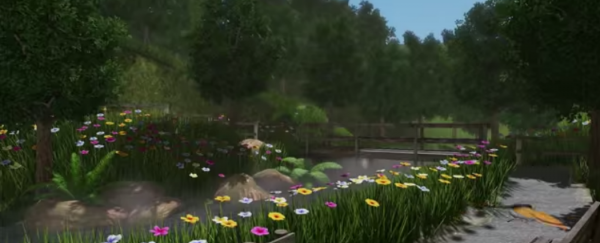In what might seem like an unlikely partnership, Alzheimer's Australia has teamed up with video game developers to create virtual experiences for people with dementia.
The first such experience is a virtual forest. It's "designed to create a sensory therapeutic environment", so people with dementia can experience the "soothing virtual reality of a forest," writes Alzheimer's Australia on their blog. At the moment, the team just has a prototype, but they're fundraising to make a full forest that reflects all the seasons.
Working with Microsoft and Xbox One, Alzheimer's Australia writes that operating the system has been designed with older people in mind:"There will be no complicated buttons or coordination needed - just a sway of the arms will make the sun rise or the wind blow through the trees, or even a season change from sunshine to snow; a clap of the hands will cause the leaves to fall or the birds to fly up."
In partnership with game developers, Opaque Multimedia, the team is also creating a simulation to help care workers and family members better empathise with patients. Users complete everyday activities, such as showering and moving about a house, while an operator manipulates the virtual surroundings:
For people with dementia, "things can look quite different," game developer Liam McGuire said on the television program, Insight. The operator can change the way the scene looks visually, including adding a 'cataract filter', making the optic lens hypersensitive or altering contrast and glare so objects blend into each other.
There are also design elements to modern houses that look different to people with dementia. Polished floor boards and shiny, white tiles can appear wet and slippery, making patients feel trepidatious as they walk around, he says, while a busy "carpet pattern can actually look like there are insects walking on it".
Operators can also move objects and change the rules of an environment to simulate dementia, making it challenging to separate reality from hallucinations, the team says. A user could even struggle, most alarmingly, to distinguish a shaving razor from a toothbrush, Alzheimer's Australia writes.
For McGuire, much of his inspiration comes from his grandfather's experience with dementia: "He was treated like a kind of clinical problem to be solved in a clinical manner, rather than as all the things we're discussing here, it's a social problem as much as anything else."
Maree McCabe, CEO of Alzheimer's Australia Victoria, says this work is a game-changer in dementia care: "Our intention is that … it will change their attitude towards people living with dementia, then their behaviour and ultimately the way that they deliver care."
It was also a whole new experience for the game developers, as the goal was to make objects hard rather than easy to use.
Either way, virtual reality looks set to shift our understanding of Alzheimer's, and will hopefully help those interacting with patients to better empathise with what they're going through.
Here's a teaser:
